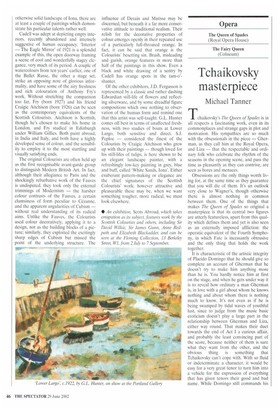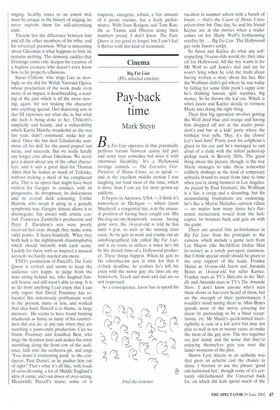Tchaikovsky masterpiece
Michael Tanner
Tchaikovsky's The Queen of Spades is in all respects a fascinating work, even in its commonplaces and strange gaps in plot and motivation. His sympathies are so much with the obsessionals in the piece — Gherman, as they call him at the Royal Opera, and Liza that the respectable and ordinary folk who celebrate the rhythm of the seasons in the opening scene, and pass the time as pleasantly as they can contrive, are seen as bores and menaces.
Obsessions are the only things worth living for, at the same time as they guarantee that you will die of them. It's an outlook very close to Wagner's, though otherwise there is almost nothing in common between them. One of the things that makes The Queen of Spades so original a masterpiece is that its central two figures are utterly featureless, apart from this quality which defines them and yet is also seen as an externally imposed affliction: the operatic equivalent of the Fourth Symphony, in which Fate is incessantly obtrusive and the only thing that holds the work together.
It is characteristic of the artistic integrity of Placid() Domingo that he should give so complete an account of Gherman that he doesn't try to make him anything more than he is. You hardly notice him at first on the stage, and when he gets under way it is to reveal how ordinary a man Gherman is, in love with a girl about whom he knows nothing and about whom there is nothing much to know. It's not even as if he is being swamped by tidal waves of youthful lust, since to judge from the music basic eroticism doesn't play a large part in the relationship between Gherman and Liza, either way round. That makes their duet towards the end of Act I a curious affair, and probably the least convincing part of the score, because neither of them is sure what they want from the other, and the obvious thing is something that Tchaikovsky can't cope with. With so fluid or indeterminate a character, it would be easy for a very great tenor to turn him into a vehicle for the expression of everything that has given tenors their good and bad name. While Domingo still commands his ringing. healthy tones to an extent that must be unique in the history of singing. he never exploits them for self-advertising ends.
Therein lies the difference between him and all the other members of his tribe: and his sovereign greatness. What is interesting about Gherman is what happens to him; he remains nothing. The demonic cackles that Domingo emits only deepen his creation of a hapless creature who doesn't even know how to be properly villainous.
Susan Chilcott, who sings Liza as movingly as she did for Welsh National Opera, whose production of the work made even more of an impact, is heartbreaking, a reading of the part which is all the more moving, again, for not making the character into anything special. Her shattering aria in Act III expresses not what she is, but what she feels is being done to her. Chilcottt's simplicity and beauty, and a vulnerability which Karita Manila, wonderful as she was last year, didn't command, make her an ideal, Once she has died Tchaikovsky summons all his skill for the grand guignol last scene, and succeeds. But we really hardly any longer care about Gherman. We never give a damn about any of the other characters, and it says a great deal for Thomas Allen that he makes so much of Yeletsky, without making a meal of his complacent aria. This is an opera that might have been written for Gergiev to conduct, with its pungencies, its abruptness, its dislocations and its overall dark colouring. Unlike Haitink, who swept it along in a grandly symphonic way, Gergiev almost allows it to disintegrate, but always with artistic control. Francesca Zambello's production and Peter J. Davidson's sets were poorly received last year, though they make some valid points, if heavy-handedly. What they both lack is the nightmarish claustrophobia which should intensify with each scene. Luckily for them, with so inspired a musical account, we hardly needed any more.
ENO's production of Purcell's The Fairy Queen is revived and seems to keep the audience very happy, to judge from the man sitting behind me, who laughed himself hoarse and still wasn't able to stop. It is so far from anything I can enjoy that I can only report that David Pountney has relocated this notoriously problematic work in the present, more or less, and worked that idea hard. Purcell is to blame, in large measure, He seems to have found burping drunkards as funny as many of his countrymen did and do, at any rate when they are watching a panto-style production. Can we blame Pountney and Jonathan Best, who sings the drunken poet and makes his entry stumbling along the front row of the audience, falls into the orchestra pit, and sings 'You darrm'd tormenting punk' to the conductor, Paul Daniel, as he pushes him out of sight? That's what it's all like, with loads of cross-dressing, a lot of Middle England's idea of camp, and vast doses of over-acting. Meanwhile Purcell's music, some of it exquisite, energetic, robust, a fair amount of it pretty routine, has a lively performance. With Joan Rodgers and Tom Randle as Titania and Oberon doing their numbers proud. I don't know. The Fairy Queen is too good to forget, but I can't feel it thrives with this kind of treatment.



































































 Previous page
Previous page